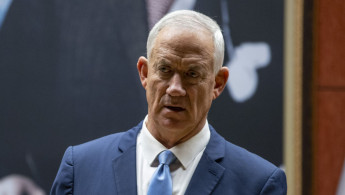Outgoing Israel defence minister sees possible attack on Iran 'in two or three years'
Israel could attack Iranian nuclear sites in two or three years, outgoing Defence Minister Benny Gantz said on Wednesday, in unusually explicit comments about a possible timeline.
With international efforts to renew a 2015 nuclear deal having stalled, the Iranians have ramped up uranium enrichment, a process with civilian uses that can also eventually yield fuel for nuclear bombs - though they deny having any such design.
Experts say Iran could potentially raise the fissile purity of its uranium to weapons-grade in short order. But building a deliverable warhead would take years, they say - an estimate echoed by an Israeli military intelligence general this month.
Speaking at a pilot's course graduation, outgoing DM Gantz says Israel has significantly increased readiness to strike Iran's nuclear facilities. Outgoing PM Lapid warns: "Our enemies should know that we will not stand idly by in the face of threats that we see as existential." pic.twitter.com/uVzS5PEpsP
— Emanuel (Mannie) Fabian (@manniefabian) December 28, 2022
"In two or three years, you may be traversing the skies eastward and taking part in an attack on nuclear sites in Iran," Gantz told graduating air force cadets in a speech.
For more than a decade, Israel has issued veiled threats to attack its arch-enemy's nuclear facilities if it deems world powers' diplomacy with Tehran a dead end. However, some experts doubt Israel has the military clout to deliver lasting damage to Iranian targets that are distant, dispersed and well-defended.
The Israeli military intelligence forecast for 2023 is that Iran "will continue on its current path of slow progress" in the nuclear realm, according to Israel Hayom newspaper on Sunday.
"Iran will only change its policies if extreme sanctions are imposed on it; then it could decide to accelerate enrichment to military grade," said the report, which a military spokesperson confirmed as citing genuine intelligence assessments.
Under an ambiguity policy designed to deter surrounding foes while avoiding provocations that can spur arms races, Israel neither confirms nor denies having nuclear weaponry. Scholars believe it does, having acquired the first bomb in late 1966.
Unlike Iran, Israel is not a signatory to the voluntary Non-Proliferation Treaty of 1970, which offers access to civilian nuclear technologies in exchange for the forswearing of nuclear weaponry.
(Reuters)





 Follow the Middle East's top stories in English at The New Arab on Google News
Follow the Middle East's top stories in English at The New Arab on Google News


